否定转移 省略
英语结构中的“否定转移”
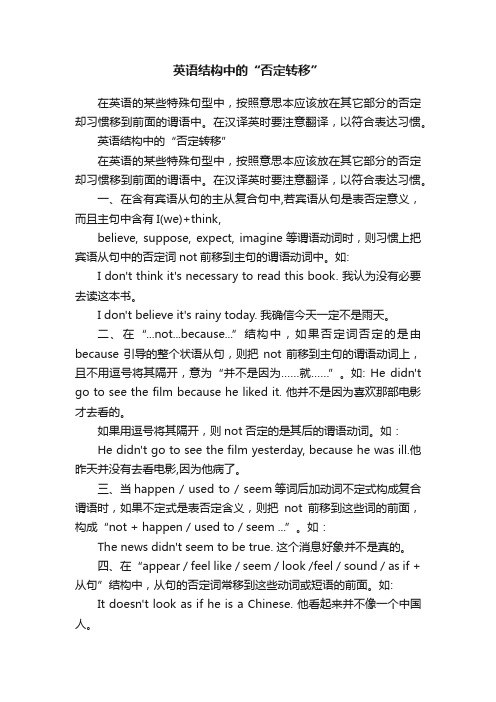
英语结构中的“否定转移”在英语的某些特殊句型中,按照意思本应该放在其它部分的否定却习惯移到前面的谓语中。
在汉译英时要注意翻译,以符合表达习惯。
英语结构中的“否定转移”在英语的某些特殊句型中,按照意思本应该放在其它部分的否定却习惯移到前面的谓语中。
在汉译英时要注意翻译,以符合表达习惯。
一、在含有宾语从句的主从复合句中,若宾语从句是表否定意义,而且主句中含有I(we)+think,believe, suppose, expect, imagine等谓语动词时,则习惯上把宾语从句中的否定词not前移到主句的谓语动词中。
如:I don't think it's necessary to read this book. 我认为没有必要去读这本书。
I don't believe it's rainy today. 我确信今天一定不是雨天。
二、在“...not...because...”结构中,如果否定词否定的是由because引导的整个状语从句,则把not前移到主句的谓语动词上,且不用逗号将其隔开,意为“并不是因为……就……”。
如: He didn't go to see the film because he liked it. 他并不是因为喜欢那部电影才去看的。
如果用逗号将其隔开,则not否定的是其后的谓语动词。
如:He didn't go to see the film yesterday, because he was ill.他昨天并没有去看电影,因为他病了。
三、当happen / used to / seem等词后加动词不定式构成复合谓语时,如果不定式是表否定含义,则把not前移到这些词的前面,构成“not + happen / used to / seem ...”。
如:The news didn't seem to be true. 这个消息好象并不是真的。
否定转移的用法

否定转移的用法公司内部编号:(GOOD-TMMT-MMUT-UUPTY-UUYY-DTTI-否定转移的用法1) 将think, believe, suppose, expect, fancy, imagine等动词后面宾语从句的否定词转移到主句中,即主句的谓语动词用否定式,而从句的谓语动词用肯定式。
I don”t think I know you. 我想我并不认识你。
I don” t believe he will come. 我相信他不回来。
注意:若谓语动词为hope,宾语从句中的否定词不能转移。
I hope you weren”t ill. 我想你没有生病吧。
2) 将seem, appear 等后的从句的否定转移到前面。
It doesn”t seem that they know where to go.看来他们不知道往哪去。
It doesn”t appear that we”ll have a sunny day tomorrow.看来我们明天不会碰上好天气。
3) 有时将动名词,介词短语或整个从句的否定转变为对谓语动词的否定。
I don”t remember having ever seen such a man.我记得从未见过这样一个人。
(not否定动名词短语 having…)It”s not a place where anyone would expect to see strange characters on the street.在这里,人们不会想到在街上会碰上陌生的人。
(anyone 作主语,从句中的谓语动词不能用否定形式。
)否定转移用法总结kenny128 (2006-03-11 12:52)有感于课文中一句话的理解)山东高唐一中刘长友外研版的新课标英语课本第二册Module 1 “Zhou Kai(2)p2中有这样一句话:I think I don’t get these things because I take a lot of exercise and am very fit.不少有学有基础的学生,其中包括一些老师,对这一个句子中,该不该用否定转移的句子,展开了激烈讨论。
否定转移
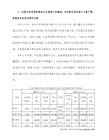
Yes, they do. 不,他们工作努力。/No, they don’t. 对, 他们工作不努力
肯定反意疑问句的回答
当陈述部分为否定式,反意疑问句为肯定式时,其回答往往与汉语不一致,需特别引起注意:
She must have read the novel last week,didn't she?
她上星期一定读了这本小说,是吗?
You must have told her about it,haven't you?
你一定把这事告诉她了,是吗?
回答
反意疑问句的回答用yes, no, 但是,回答意思相反,当陈述部分是否定形式时,回答要按事实。如:
在这种句式中,not从宾语从句的谓语动词的前面转移到了主句谓语动词think,believe,suppose等的前面。例如:
I&ink I know you.对不起,我想我并不认识你。
I don't believe he'll come.我想他是不会来的。
Let me help you,may I?
Turn on the radio, will you?
There be句型
There be 句型中,反义疑问部分必须为 be 动词 + there
There are some apples in the basket, aren't there?
3.not…+动词不定式或介词短语
在这类结构中,我们实际上是将否定后面不定式的not转移到了谓语动词上。如:
Jack doens't seem to like you.(= Jack seems not to like you.)杰克看来不喜欢你。
高中英语中的否定转移以及部分否定

英语中的否定转移○1“I don’t think he is a good doctor.”翻译:我认为他不是个好医生。
I don’t think you will have any difficulty in finding the boy’s dormitory.翻译:我认为你找到男生宿舍不会有困难。
否定转移的主句动词在语义上可分为两类:A:表示看法的动词:be supposed to, believe, expect, imagine, suppose, think,fancy,guess,should say 等表示主观意见和猜想的动词在句中作谓语时,按习惯其宾语从句的否定通常转移到主句。
如:1. I didn’t think I have seen you before.2. She didn’t imagine that we would sayanything.B:表示感觉的动词:在seem,feel,taste,sound,appear,look like, feel as if, look as if, sound as if作联系动词的句子中,特别是seem,按习惯以它的否定来代替其他部分的否定。
例如:1. The baby doesn’t appear to be awake.2. It doesn’t look(看起来) like it’s(天不会)going to rain.3.English doesn't seem easy to learn. 英语好像不容易学。
4.It didn't seem during those years that there could be anyone else who might share my own peculiar tastes. 在那些年月里,似乎没有人会有我这样的特殊情趣。
类似的情况还有半助动词happen。
高中英语语法讲练结合-否定句省略句

第25章否定句一.概念否定句指否定陈述句的句子. 二.相关知识点精讲1.用not构成的否定句:主语+助动词/ be+not+… 例句:例句:He is not back yet. It is not true. We haven’t forgotten you.You shouldn’t be so silly.We haven’t been invited yet.He won’t go, but they will.Money could not buy happiness. I like the salad, but I don’t like this soup.He wants a girl friend, but he doesn’t want to get married.You didn’t understand what I said, did you ?You needn’t try to explain.I didn’t use to like opera, but now I’m getting interested.I usedn’t to like opera, but now I’m getting interested.2.祈使句的否定句:Don’t+动词原形…。
例句:例句:Don’t worry. I’ll look after you.Don’t believe a word he says.Don’t be so rude.3. 非谓语动词(不定式,分词,动名词)的否定式:把not放在to do; doing; 的前面。
It’s important not to worry.He said he deeply regretted not being able to help. Not knowing what to do, Shelly asked advice of her friend. He reproached me for not having told it to him. 4. not与除谓语以外的其他句子成分连用:Come early, but not before six. It’s working, but not properly.I believe he will succeed, though not without some difficulty. elieve; I’m afraid; I guess; I suppose; I expect之后,构成省略句。
谈否定转移与否定不转移现象

谈否定转移与否定不转移现象湖南邵东县两市镇一中/申玉文一、否定转移现象英语中表达观点、信念、猜测时的主从复合句在表示“认为……不”等含义的宾语从句中,常需要否定转移,即主句谓语动词用否定式,宾语从句谓语动词用肯定式。
例如:我认为鸡不会游泳。
应译成“I don't think that chicken can swim.”1.常用该结构的动词有think, guess, suppose, think, believe, expect, imagine, feel等。
例如:I don't suppose we'll go climbing next week.我想我们下星期不会去爬山。
I don't believe that he has left.我相信他还没离开。
I don't guess he can ride a horse.我认为他不会骑马。
2.否定转移结构常用于一般现在时,且主语为第一人称(I,we),并且含否定前移的主从句,它的反意疑问句应根据从句来变化。
例如:I don't think he is right, is he?我认为他不对,是吗?I think he is right, isn't he?我认为他是对的,是吗?二、否定不转移现象否定转移结构通常用于一般现在时,当主句中谓语动词为“一般过去时”或“过去进行时”、“过去进行时”、“现在完成时”等时态时,否定不转移。
其次,还有下面几种情况否定不转移。
1.当think用在疑问句中时。
例如:Why do you think I can't do it?你为什么认为我不会做它呢?Do you think my father won't agree?你认为我父亲不会同意吗?2.当主句的谓语动词与情态动词连用时。
例如:He must think I can not fit for the job.他一定认为我不适合这项工作。
初一英语否定形式的知识点总结
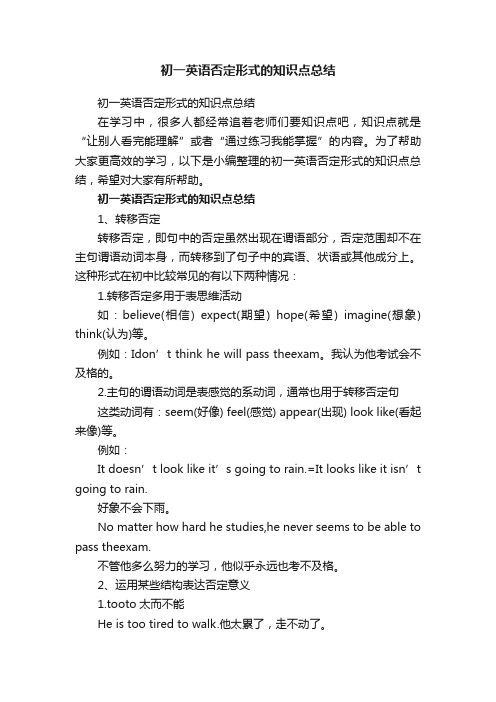
初一英语否定形式的知识点总结初一英语否定形式的知识点总结在学习中,很多人都经常追着老师们要知识点吧,知识点就是“让别人看完能理解”或者“通过练习我能掌握”的内容。
为了帮助大家更高效的学习,以下是小编整理的初一英语否定形式的知识点总结,希望对大家有所帮助。
初一英语否定形式的知识点总结1、转移否定转移否定,即句中的否定虽然出现在谓语部分,否定范围却不在主句谓语动词本身,而转移到了句子中的宾语、状语或其他成分上。
这种形式在初中比较常见的有以下两种情况:1.转移否定多用于表思维活动如:believe(相信) expect(期望) hope(希望) imagine(想象) think(认为)等。
例如:Idon’t think he will pass theexam。
我认为他考试会不及格的。
2.主句的谓语动词是表感觉的系动词,通常也用于转移否定句这类动词有:seem(好像) feel(感觉) appear(出现) look like(看起来像)等。
例如:It doesn’t look like it’s going to rain.=It looks like it isn’t going to rain.好象不会下雨。
No matter how hard he studies,he never seems to be able to pass theexam.不管他多么努力的学习,他似乎永远也考不及格。
2、运用某些结构表达否定意义1.tooto太而不能He is too tired to walk.他太累了,走不动了。
2.more A than B(与其B不如A)或more than+含有can的从句例如:1、They oung man is more brave than wise.这年轻人有勇无谋。
2、The grat it ude for your help is more than I can express.对于你给我的感激之情我无法言表。
英语句子的否定转移用法

英语句子的否定转移用法1.当think, believe, suppose, expect, fancy, imagine等动词的主语为第一人称,且本身为一般现在时态时,其后的宾语从句的否定词通常转移到主句中,即主句的谓语动词用否定式,而从句的谓语动词用肯定式。
如:I don’t believe you need worry.我相信你不必忧虑。
I don’t think you need take it too seriously. 我想你不必对此过于认真。
但是,若谓语动词为hope,宾语从句中的否定词不能转移。
如:I hope it doesn’t rain.我希望不要下雨。
I hope you don’t mind my saying it.我希望你别介意我说这些话。
2.许多动词后面可以接动词不定式。
在非正式文体中,我们常常愿意把第一个动词加上否定词,而不用否定的动词不定式。
其实这样做一点也不改变意思。
例如与appear, seem, expect和happen连用时,就是这样的。
如:Sibyl doesn’t seem to like you.西比尔好像不喜欢你。
I don’t expect to see you before Monday.我估计星期一之前不会见到你了。
It does not seem that the man understand what I am saying. 那男人似乎不了解我在说什么。
与“intend / want+动词不定式”连用时,我们几乎总是将not / never与第一个动词放在一起。
如:I don’t want to fail this exam.这次考试我不想考不及格。
After I’ve finished this contract I never intend to teach again. 这个合同期满后,我决不想再教书了。
请注意can’t seem to…这一结构。
英语中的否定转移现象分析-最新文档

英语中的否定转移现象分析在英语学习中,我们常可见到think,suppose,expect这类表达猜想判断动词后面的that从句有否定意思时,要把主句动词变成否定式,也就是把宾语从句的否定转移到主句中,这就是人们常说的“否定转移”。
英语中的否定转移形式很多,下面是几种常见的形式。
一、宾语从句的否定转移为主句的谓语动词否定1、当think,suppose,expect,believe,imagine,fancy,guess,figure,consider,calcuate,reckon,anticipate,feel等表示主观意见和猜想的动词在主句中作谓语的时候,按习惯将宾语从句的否定转移到主句中。
例:1)I don’t think she should go home alone.我认为她不该独自回家。
2)He doesn’t suppose you are good friends.他猜想你们不是好朋友。
3)She doesn’t imagine we have finished the job yet.她以为我们还没有完成任务。
4)I don`t feel that you should let him get away withdoing noting.我认为你不应该让她逃避,什么也不做。
表示主管看法的动词并非都用于否定转移。
一般来讲,如果否定位于动词和否定宾语或补语的意义不同,否定词就必须置于要否定的部分之前,这类动词主要有:mean,know,hear,hope,fear,assume,surmise,presume,etc.请比较下列几组例句。
A、I don’t mean you did it right.我并不是说你做的对。
I mean you didn’t do it right.我是说你做的不对。
B、He heard that I would go abroad.他听说我不出国了。
关于英语中否定转移现象的探讨word精品文档4页

关于英语中否定转移现象的探讨随着社会的发展,英语作为人类交际的重要工具,在实践中也不断丰富和发展起来。
在英语学习中,如果理解句子单凭句子形式,以汉语习惯类推,往往会把意思弄反,闹出许多笑话。
一、否定转移的定义夸克等人在其编著的《当代英语语法》一书中,将否定词not意义上属于原来应处的位置移到别的地方,这种语法现象称为否定转移(Transferred Negation)。
也就是指位置上和一个词或短语或从句放在一起的否定词,有时在意义上或逻辑上可转移到否定另一个词或短语或从句。
(一)否定转移的种类否定转移的种类有很多,笔者通过多年的教学实践,归纳出以下常见几种:1.否定谓语动词的否定转移。
形式上否定谓语动词而在意义上或逻辑上却转移到否定另一句子成分。
(1)We don’t read the novels for amusement.我们读小说不是为了消遣。
(而不是“我们不读小说…..”)否定词not在位置上否定谓语动词 read,但在在意义上或逻辑上转移到否定介词短语for amusement。
(2)He didn’t wr ite his paper correctly.(意义上或逻辑上否定副词correctly)他的论文写得不正确. (而不是“他不写他的论文…..”)(3)The seed does not complain because there are stones and turf in its way. (意义上或逻辑上否定because引出的状语从句)种子并不是因为有石头和草皮压在其上而鸣不平。
(而不是“种子不抱怨…..”)(4)I don’t think that he wil l come here today. (意义上或逻辑上否定that 引出的宾语从句)我想他今天不会来这里的。
I don’t think,It doesn’t seem that….这类否定转移只限于主句中表示“判断,假象或感觉”等动词。
高中英语否定转移(全面)

否定转移否定转移(Transferred Negation)是指否定形式在谓语动词,而否定的信息焦点却在状语和表语,或否定形式在主句,而否定的信息焦点却在从句。
这是英语的一种习惯思维方法,与汉语不同,应予注意。
分类归纳1.Not + think,believe,suppose,imagine…+that-clause(that 从句)在这种句式中,not从宾语从句的谓语动词的前面,转移到了主句谓语动词think,believe,suppose等的前面。
即(否定前移)例如:e.g.:I'm sorry,but I don't think I know you.对不起,我想我并不认识你。
e.g.:I don't believe he'll come.我想他是不会来的。
这类句子后面的反意疑问句更能准确地说明not的否定范围。
如:I don't think you've met Xiao Xin,have you?我想你没遇见小新,对吗?在初中范畴,做这类否定转移的反义疑问句的窍门:例句:I don't think you've met Xiao Xin(改成反义疑问句)步骤1:将否定转移掉,原句变为:I think you haven't met Xiao Xin.步骤2:把I think 无视掉,原句变为:You haven't met Xiao Xin .步骤3:按照一般方法,后面加上:have you ?上述做题方法在初中范围内95%是能用的。
2.not…because(of)这种结构中的 not否定的是后面 because引导的从句或 because of引起的介词短语。
也就是说,not从because(of)的前面转移到了主句或整个句子的谓语动词的前面。
例如:He was not ready to believe something just because Aristotle said so.他并不只是因为亚里士多德说过某事如何如何,就轻易相信它。
初中英语语法对否定转移的用法及总结

初中英语语法对否定转移的用法及总结初中英语语法对否定转移的用法及总结下文是老师为同学们带来关于在什么情况下会使用到否定转移,希望可以帮助到大家。
否定转移1) 将think, believe, suppose, expect, fancy, imagine等动词后面宾语从句的否定词转移到主句中,即主句的谓语动词用否定式,而从句的谓语动词用肯定式。
I don't think I know you. 我想我并不认识你。
I don' t believe he will come. 我相信他不回来。
注意:若谓语动词为hope,宾语从句中的否定词不能转移。
I hope you weren't ill. 我想你没有生病吧。
2) 将seem, appear 等后的从句的否定转移到前面。
It doesn't seem that they know where to go.看来他们不知道往哪去。
It doesn't appear that we'll have a sunny day tomorrow.看来我们明天不会碰上好天气。
3) 有时将动名词,介词短语或整个从句的否定转变为对谓语动词的否定。
I don't remember having ever seen such a man.我记得从未见过这样一个人。
(not否定动名词短语having…)It's not a place where anyone would expect to see strange characters on the street.在这里,人们不会想到在街上会碰上陌生的人。
(anyone 作主语,从句中的谓语动词不能用否定形式。
)4) 有时状语或状语从句中否定可以转移到谓语动词前。
The ant is not gathering this for itself alone. (否定状语) 蚂蚁不只是为自己采食。
翻译技巧(4)省略和否定翻译
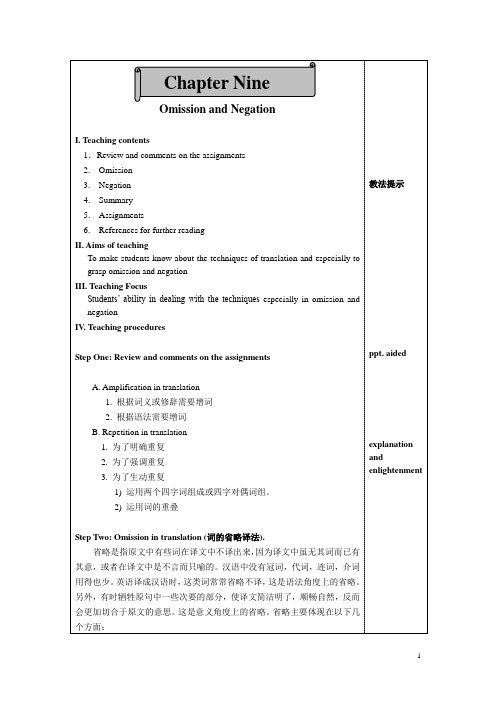
1
A、语法角度上的省略 、 前面讲过英语和汉语在语法方面有很大差异, 翻译时要根据各自的语法 特点适当地进行删减, 使译文更为符合译语的表达习惯。例如: 1.A camel is much inferior to an elephant in strength. 骆驼的力气远不如大象。 (省略不定冠词) 2.The earth is round. 地球是圆的。 (省略定冠词) 3.The flowers are beautiful. 这些花很美。 (省略系动词) 4.Early to rise and early to bed makes a man healthy. 早睡早起使人身体健康。 (省略连词 and 和不定冠词 a ) 5.As it is late, you’d better go home. 时间不早了,你该回家了。 (省译原因的从属连词 as) 6.Metals expand when heated and contract when cooled. 金属热胀冷缩。 (省译从属连词 when) 7.I won’t go if you are not going. 你不去,我也不去。 (省译连词 if) 8.It was very quiet at the moment. 当时很安静。 (省译 it) 9.Don’t put your hands in your rocket. 别把手放在口袋里。 (省译两个物主代词) 10.Those who are in favour please hold up their hands. 赞成的请举手。 (省译指示代词、关系代词和物主代词) 11.Suddenly, there came a knock at the door. 突然响起了敲门声。 (省译介词) 12.I’m warning you for the last time. 我最后一次警告你。 (省译介词) 注意: 英语介词用的比汉语多, 译成汉语时可译成相应的介词或转译成 动词,其他情况下一般不译出来。 13.The precuts produced in our factory are good in quality and low in price. 我们厂的产品物美价廉。 14. Smoking is prohibited in public places. 公共场所不准吸烟。 (省略表地点的介词)
解析英语句子的否定转移

解析英语句子的否定转移解析英语句子的否定转移解析英语句子的否定转移1. 当think, believe, suppose, expect, fancy, imagine等动词的主语为第一人称,且本身为一般现在时态时,其后的宾语从句的否定词通常转移到主句中,即主句的谓语动词用否定式,而从句的谓语动词用肯定式。
如:I don’t believe you need worry. 我相信你不必忧虑。
I don’t think you need take it too seriously. 我想你不必对此过于认真。
但是,若谓语动词为hope,宾语从句中的否定词不能转移。
如:I hope it doesn’t rain. 我希望不要下雨。
I hope you don’t mind my saying it. 我希望你别介意我说这些话。
2. 许多动词后面可以接动词不定式。
在非正式文体中,我们常常愿意把第一个动词加上否定词,而不用否定的动词不定式。
其实这样做一点也不改变意思。
例如与appear, seem, expect和happen连用时,就是这样的。
如:Sibyl doesn’t seem to like you. 西比尔好像不喜欢你。
I don’t expect to see you before Monday. 我估计星期一之前不会见到你了。
It does not seem that the man understand what I am saying. 那男人似乎不了解我在说什么。
与“intend / want+动词不定式”连用时,我们几乎总是将not / never与第一个动词放在一起。
如:I don’t want to fail this exam. 这次考试我不想考不及格。
After I’ve finished this contract I never intend to teach again. 这个合同期满后,我决不想再教书了。
否定转移的用法
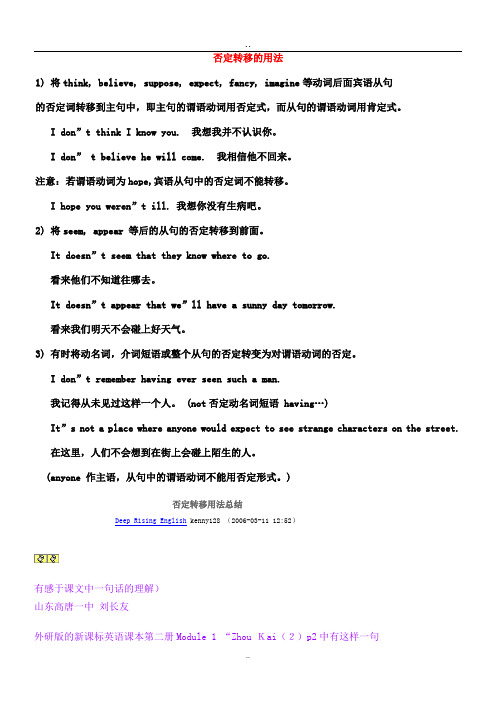
否定转移的用法1) 将think, believe, suppose, expect, fancy, imagine等动词后面宾语从句的否定词转移到主句中,即主句的谓语动词用否定式,而从句的谓语动词用肯定式。
I don”t think I know you. 我想我并不认识你。
I don” t believe he will come. 我相信他不回来。
注意:若谓语动词为hope,宾语从句中的否定词不能转移。
I hope you weren”t ill. 我想你没有生病吧。
2) 将seem, appear 等后的从句的否定转移到前面。
It doesn”t seem that they know where to go.看来他们不知道往哪去。
It doesn”t appear that we”ll have a sunny day tomorrow.看来我们明天不会碰上好天气。
3) 有时将动名词,介词短语或整个从句的否定转变为对谓语动词的否定。
I don”t remember having ever seen such a man.我记得从未见过这样一个人。
(not否定动名词短语 having…)It”s not a place where anyone would expect to see strange characters on the street.在这里,人们不会想到在街上会碰上陌生的人。
(anyone 作主语,从句中的谓语动词不能用否定形式。
)否定转移用法总结Deep Rising English kenny128 (2006-03-11 12:52)有感于课文中一句话的理解)山东高唐一中刘长友外研版的新课标英语课本第二册Module 1 “Zhou Kai(2)p2中有这样一句话:I think I don’t get these things because I take a lot of exercise and am very fit.不少有学有基础的学生,其中包括一些老师,对这一个句子中,该不该用否定转移的句子,展开了激烈讨论。
湖南省汝城二中高三英语语法复习系列讲解--否定转移

否认转移1) 将 think , believe , suppose, expect, fancy, imagine 等动词后边宾语从句的否认词转移到主句中,即主句的谓语动词用否定式,而从句的谓语动词用一定式。
I d on't think I know you.我想我其实不认识你。
I don' t believe he will come.我相信他不回来。
注意:若谓语动词为hope,宾语从句中的否认词不可以转移。
I hope you weren't ill.我想你没有患病吧。
2)将 seem, appear 等后的从句的否认转移到前方。
It doesn't seem that they know where to go.看来他们不知道往哪去。
It doesn't appe ar that we'll have a sunny day tomorrow.看来我们明日不会碰上晴天气。
3)有时将动名词,介词短语或整个从句的否认转变成对谓语动词的否认。
I don't remember having ever seen such a man.我记得从未见过这样一个人。
(not 否认动名词短语having )It's not a place where anyone would expect to see strange characters on the street.在这里,人们不会想到在街上会碰上陌生的人。
(a nyone 作主语,从句中的谓语动词不可以用否认形式。
)4)有时状语或状语从句中否认能够转移到谓语动词前。
The ant is not gathering this for itself alone.(否认状语 )蚂蚁不不过为自己采食。
He was not ready to believe something just because Aristotle said so. ( 否认 because状语 ) 他其实不因亚里斯多德说过怎样怎样,就轻信此事。
- 1、下载文档前请自行甄别文档内容的完整性,平台不提供额外的编辑、内容补充、找答案等附加服务。
- 2、"仅部分预览"的文档,不可在线预览部分如存在完整性等问题,可反馈申请退款(可完整预览的文档不适用该条件!)。
- 3、如文档侵犯您的权益,请联系客服反馈,我们会尽快为您处理(人工客服工作时间:9:00-18:30)。
一、动词的否定转移1.当动词think, believe, suppose, 形式上否定主句的谓语,实际上是否定从句的谓语imagine, expect, feel的主语是第一人称、谓语动词为没有任何副词修饰的一般现在时,它们的否定式实际上是对宾语从句的否定。
表示说话者提出一种委婉的看法或主张。
如:I think that he will help us. —I don’t think that he will help us. 我认为它不会帮助我们。
I believe that he is right. —I don’t believe that he is right. 我认为他不对。
I suppose that he likes it. —I don’t suppose that he likes it. 我想他不喜欢它。
2. 形式上否定谓语动词,实际上否定复合宾语当动词think, believe, suppose, imagine, expect, feel, find的主语是第一人称、谓语动词为没有任何副词修饰的一般现在时,它们前面的否定式实际上是对复合宾语的否定。
表示说话者所提出的一种委婉的看法或主张。
如:I think math difficult. —I don’t think math difficult. 我认为数学不难。
I find the story interesting. —I don’t find the story interesting. 我认为这个故事没有趣。
I expect so. —I don’t expect so. 我认为不会。
注意:动词think, believe, suppose, imagine, expect, feel在下列情况下,否定不转移:(1) 这些动词跟其他另一个动词一起做并列谓语时,否定不转移。
如:I believe and hope hewon’t do that. 我相信并且也希望他将不会那样做。
I feel and admit that we are not foolish. 我觉得并且也承认我们并不愚蠢。
(2) 用于疑问句时,否定不转移。
如:Do you think it is not going to rain? 你认为天不会下雨吗?Don’t you believe that he has done a good thing? 难道你不相信他做了一件好事?(3) 用作插入语时,否定不转移。
如:Li Lei, I think, won’t be angry with you. 我想李蕾不会生你的气。
Tom, I suppose, won’tbe against it. 我猜想汤姆不会反对。
Mike, I believe, hasn’t seen the film. 我认为迈克没有看这场电影。
(4) 动词前有其他副词修饰时,否定不转移。
如:I really don’t think it’s necessary for us to go there now. 我的确不认为我们有必要去那儿。
I feel strongly that he shouldn’t do such a thing. 我强烈地认为他不应该做那样的事。
(5) 动词为非一般现在时或主语不是第一人称时,否定不转移。
I thought that he wouldn’t come back soon. 我原以为他不会回来得这么快。
She didn’t believe that he became a good boy. 她不相信它变成了一个好孩子。
He thinks that he isn’t fit for the job. 他认为他不适合这件工作。
He doesn’t believe that what we told him is true. 他不相信我们告诉他的事是真的。
(6) 当宾语从句中含的否定为not…at all, not a little, not a few, not enough, can’t help等固定搭配时,否定不转移。
如:I think that he doesn’t know it at all. 我想他对那一点也不知道。
I suppose that it is notenough to remember the words if you want to learn the language well. 我认为如果你想把这门语言学好,那么只记单词是不够的。
I believe that you can’t help singing our national anthem when you win the first place in the Olympic Games. 我相信当你在奥运会上获得第一名时你会情不自禁地唱起国歌来。
(7) 当宾语从句中含no, nothing, nobody, nowhere, hardly, seldom, little, few等否定词或半否词时,否定不转移。
如:I believe that nothing can make me give it up. 我想任何事情也不能使我放弃。
I think that no one can escape if the ship sinks in the sea. 我认为如果这艘船沉入海底的话,那么谁也逃不掉。
I suppose that he is a man of few words. 我猜想他是一个言语不多的人。
二、英语句子的否定转移1. 当think, believe,suppose, expect, fancy, imagine等动词的主语为第一人称,且本身为一般现在时态时,其后的宾语从句的否定词通常转移到主句中,即主句的谓语动词用否定式,而从句的谓语动词用肯定式。
如:I don’t believe you need worry. 我相信你不必忧虑。
I don’t think you need take it too seriously. 我想你不必对此过于认真。
但是,若谓语动词为hope,宾语从句中的否定词不能转移。
如:I hope it doesn’t rain. 我希望不要下雨。
I hope you don’t mindmy saying it. 我希望你别介意我说这些话。
2. 许多动词后面可以接动词不定式。
在非正式文体中,我们常常愿意把第一个动词加上否定词,而不用否定的动词不定式。
其实这样做一点也不改变意思。
例如与appear, seem, expect 和happen连用时,就是这样的。
如:Sibyl doesn’t seem to like you. 西比尔好像不喜欢你。
I don’t expect to see you before Monday. 我估计星期一之前不会见到你了。
It does not seem that the man understand what I am saying. 那男人似乎不了解我在说什么。
与“intend / want+动词不定式”连用时,我们几乎总是将not / never 与第一个动词放在一起。
如:I don’t want to fail this exam. 这次考试我不想考不及格。
After I’ve finished this contract I never intend toteach again. 这个合同期满后,我决不想再教书了。
请注意can’t seem to…这一结构。
如:I can’t seem to get anything right. 看来我什么事也干不好。
3. 有时将动名词,介词短语或整个从句的否定转变为对谓语动词的否定。
例如:I don’t remember having ever seen such a man.我记得从未见过这样一个人。
(not否定动名词短语having…)It’s not a place where anyone would expect to see strange characters on the street. 在这里,人们不会想到在街上会碰上陌生的人。
(anyone 作主语,从句中的谓语动词不能用否定形式。
)4. 有时状语或状语从句中否定可以转移到谓语动词前。
如:The ant is not gathering this for itself alone.蚂蚁不只是为自己采食。
(否定状语)He was not ready to believe something just because Aristotle said so.他并不因亚里斯多德说过如何如何,就轻信此事。
(否定because状语) She had not been married many weeks when that man’s younger brother saw her and was struck by her beauty. 她结婚还不到几个月,这个人的弟弟就看见她了,并对她的美貌着了迷。
(否定状语many weeks)有些句子形式上否定谓语动词,实际上是对句子后面状语进行否定。
如:Let’s not talk about it here. 我们别在这里谈吧。
Don’t read in the sun. 不要在阳光下看书。
Don’t talk with your mouth full of food. 不要口里含着食物说话省略的用法一. 概念英语中,为了避免重复,常常省略句子中的一个或几个成分,这样的句子叫省略句二.相关知识点精讲1. 简单句中的省略:在对话中,交谈双方都知道谈论的对象,则可以省略句子的主语,省略主语和谓语的现象在交际用语中出现的很多。
(1)Looks like rain.(2)Hope to hear from you soon.(3)Sounds like a good idea.(4)Beg your pardon. (5)Feeling better today ? (6)This way, please. (7)—What does he want to eat ?—Some rice and vegetables.(8)Anything I can do for you ?(9)Sorry to hear that.(10)Doesn’t matter.(11)Terrible weather! (12)Pity you couldn’t come.2. 并列句中的省略:在并列句中,相同的成分如主语,谓语,宾语等都可以省略:(1)They learn French and we English.(2)My father planned and built all these houses. (3)John won the firstrace and Jimmy the second.(4)Coral is not a plant but a variety of animal life.3. 复合句中的省略:定语从句:(1)That’s the reason he is late for the conference. (2)I don’t like the way he talks.状语从句:(1)If heated, water willboil.(2)Tom was attacked by cramp while swimming across the river.(3)We’ll go to help you if necessary.(4)Had I time, I would come.(5)I’ll go, should it be necessary.(6)The captain can find a boat quicker than we can.宾语从句:如果宾语从句中的谓语部分与主句的谓语部分或上文的谓语部分相同,可将从句部分的谓语省略。
